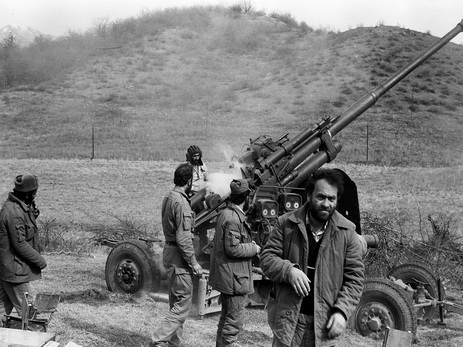The Hill: Armenia and Azerbaijan - a dawn of a regional war?

Maayan Jaffe-Hoffman
Much attention has been showered on the intensifying of violence between Azerbaijan and Armenia in the mountainous Nagorno-Karabakh region of western Azerbaijan. Several dozen of soldiers and civilians have been killed in the fighting, which was instigated by Armenia on April 1 when Armenian positions fired intensive artillery at nearby Azerbaijani positions and residential areas.
This is not a new war. Fighting between the two sides started more than 30 years ago, in the late 1980s. It escalated into a full-fledged war in 1991 as the Soviet Union collapsed. More than 30,000 people were killed before a ceasefire was instituted in 1994.
In other words, this is a fight over the 20 percent of Azerbaijani's internationally recognized territory, which has been occupied by Armenia since 1994.
According to a statement released earlier this week by the Ministry of Foreign Affairs of Azerbaijan, as a result of this occupation, around 800 thousand Azerbaijanis have been forced to flee their homes (a fact verified by the international community); one in nine people are in Azerbaijan are considered internally displaced persons. The UN Security Council has recognized Azerbaijan's right to this territory with Resolutions 822, 853, 874 and 884, among others. Armenia has continued to ignore the resolutions.
However, this is not only a battle over territory. Rather, it is simultaneously a struggle over culture, diversity, inclusiveness and, most importantly, independence and diverging vision for the future of the South Caucasus..
The first large-scale Armenian attack took place while President Ilham Aliyev arrived in the United States to attend the fourth Nuclear Security Summit in Washington, D.C. During the visit, which included meetings with U.S. Secretary of State John Kerry, Vice President Joe Biden and President Obama himself, Azerbaijan-U.S. relations were deemed close, cordial, active and strategic. In fact, both Vice President Biden and Secretary Kerry offered strong support for bilateral ties and stressed importance of Azerbaijan’s territorial integrity and reaching a comprehensive settlement soon.
In remarks, Aliyev and U.S. leaders highlighted more than $10 bil in U.S. economic investment in Azerbaijan, cooperation on important projects such as construction of oil pipelines connecting Caspian and Mediterranean Seas, and collaboration on the Southern Gas Corridor, a project of energy security, energy diversification, and of long-term benefit to all the participants – producers, transit countries and consumers.
The timing of the first attacks is no coincidence. It was a blunt reminder by Azerbaijan's big brother to the north (Russia) that no one in "their sphere" should be too cozy with the West.
Armenia in recent years has effectively become an extension of Russian military in the region. Only months ago, Armenia announced that in addition to joining the Eurasian Customs Union, Moscow's opposition to the European Union, and the Collective Security Treaty Organization, Moscow's alternative to NATO, that Armenia would coordinate all foreign affairs with Moscow. This is in addition to the $200 million export loan Russia provided Armenia in February to finance the delivery of Russian military products, including Russian Smerch rocket launchers and ammunition, Igla-S air defense missile systems, RPG-26 grenade launchers and more.
Azerbaijan is celebrated by the West as the sole Muslim-majority democracy in Eurasia, rubbing the hostile autocracies in the area and the Middle East, including the theocratic Iranian regime next door, wrong way.
Further, NATO-member Turkey backs Azerbaijan. Tensions between Russia and Turkey have been rising in recent months, especially since Turkey shot down a Russian warplane that violated its airspace from Syria back in November 2015.
The European Union has admittedly been pre-occupied with a series of regional challenges: the Syrian civil war, the refugee crisis, the chilling rise of Islamic terrorism. But it is not despite these tensions, but as such that Europe – with the U.S. – must take swift action to solve the Azerbaijan-Armenian crisis. The West cannot afford another flash point; a war between Azerbaijan and Armenia could pull in Turkey and Russia.
The recent violence proved that the current stalemate can’t last. It is time to begin ending Armenia’s occupation, return of the displaced, normalizing lives of both Armenian and Azerbaijani communities in Nagorno-Karabakh and fully integrating Armenia into the region. More than two decades of the "Minsk Process" to find a peaceful solution to the situation have failed. Now, international players must get involved and contribute to the peace process and future prosperity once and for all.
Jaffe-Hoffman is director of internationalcommunications for a leading Israeli think tank and has been a journalist for 20 years. She is a former breaking news editor for the Jerusalem Post and a former editor-in-chief of the Baltimore Jewish Times. She has written thousands of articles relating to international relations and politics, which have been published by media outlets in the U.S., Israel and around the world














